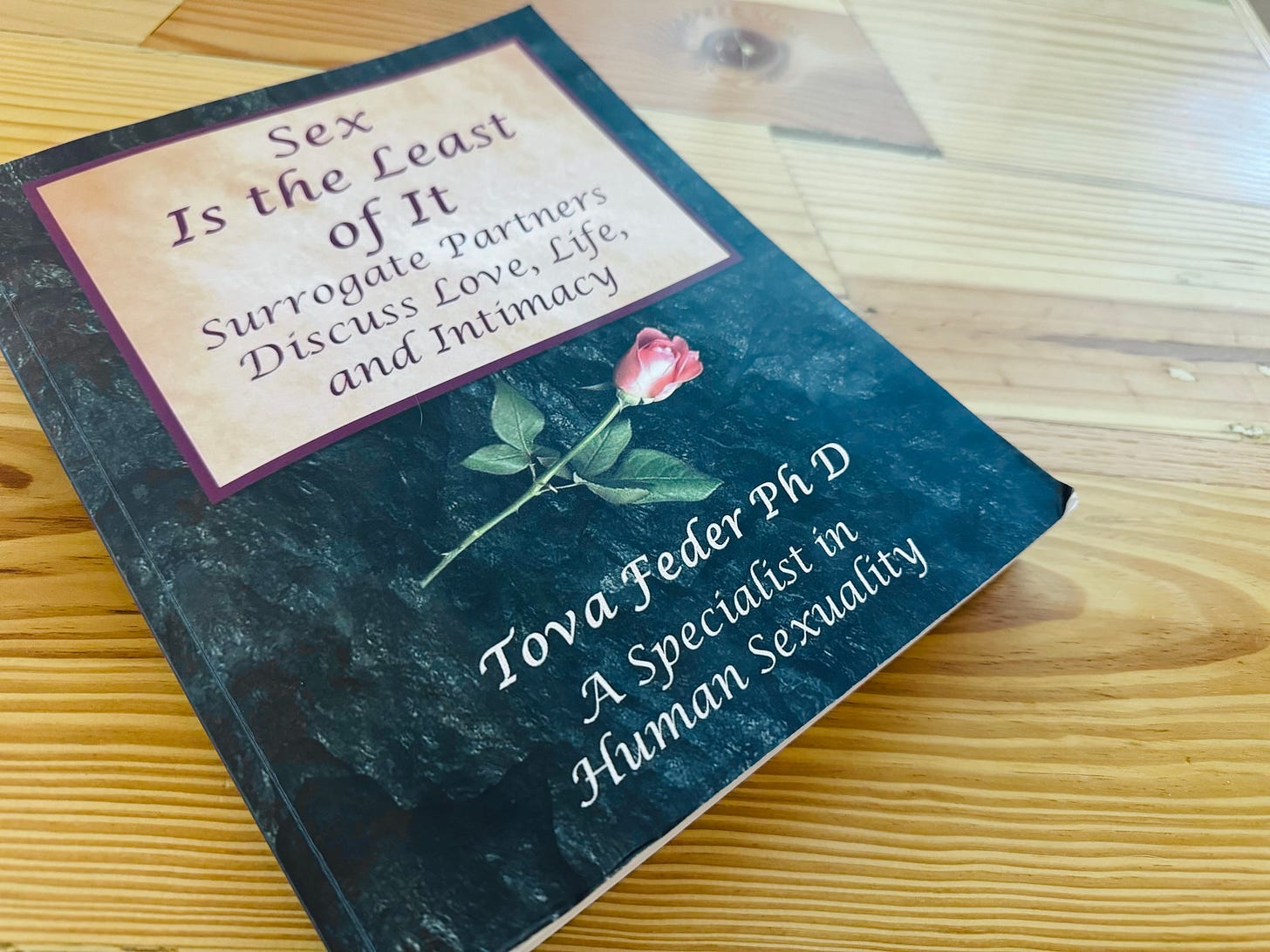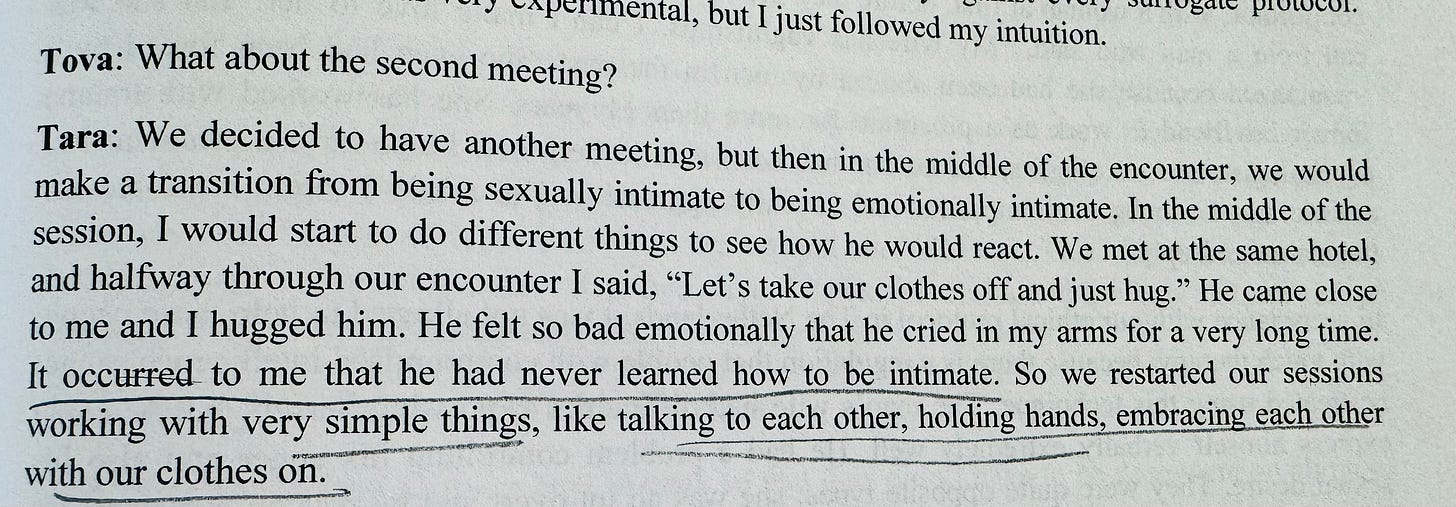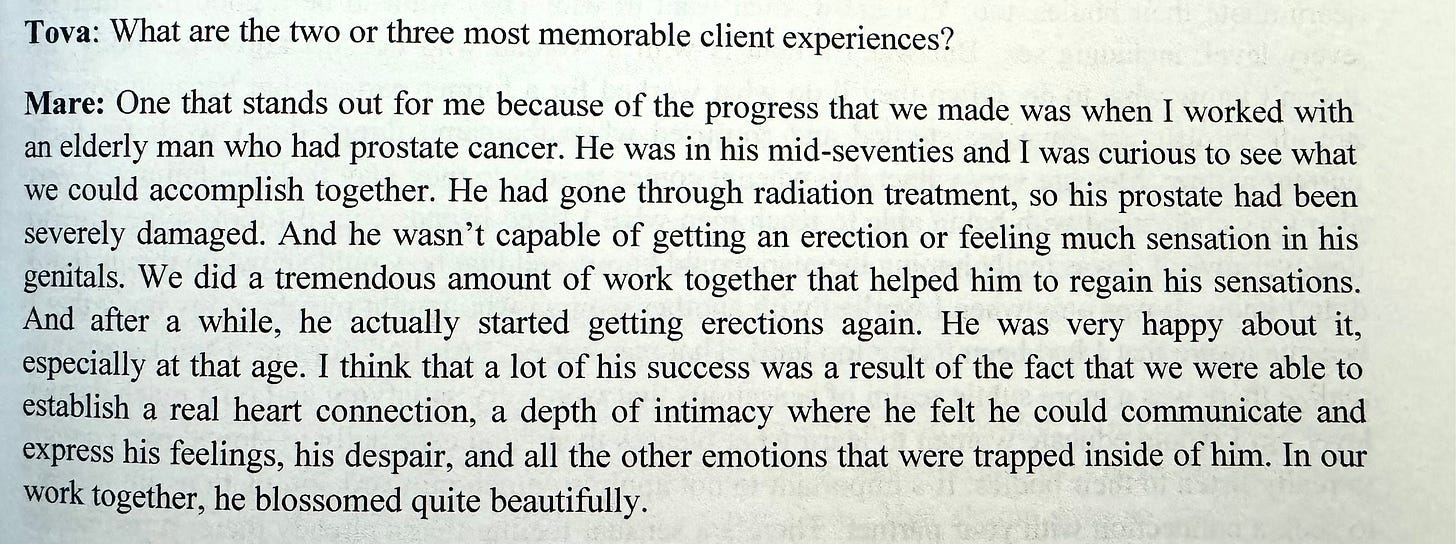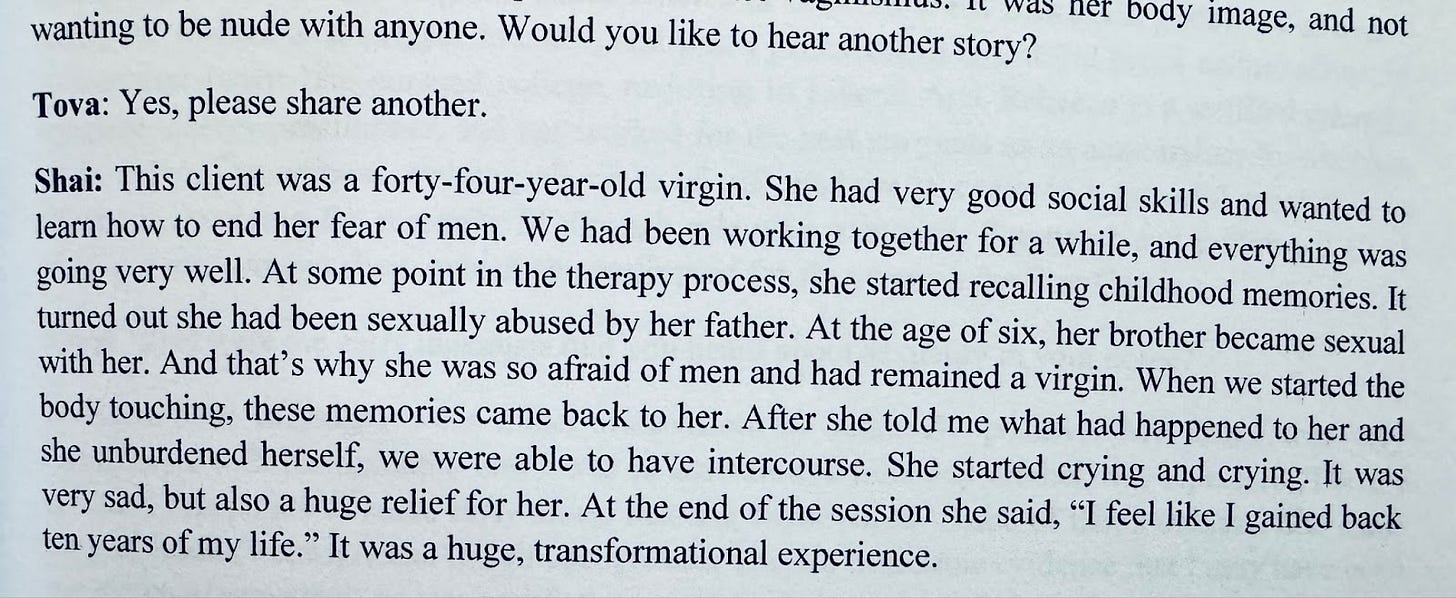
Listen to this episode.
I am one of those people who experiences new relationship energy with concepts, shoehorning my latest pet topic into every conversation.
“Have you heard of emotional immaturity?” Me last November.
“Have you heard of overvalent ideas?” Me last January.
“Have you heard of surrogate partners?” Me last February, to my friend Maggie.
She has not. So far, no one has. But my friends guess anyway.
“Is it the person who carries your baby because you can’t?” Close, but no.
“Is it the brother of your husband, but your husband has died in The War, and so now you have to marry his brother instead?” No, but I vaguely recall this practice; I can see the sepia-toned couple now. She looked pissed.
I’ve been talking with partner surrogates for the past nine months. It feels like non-monogamous moms in that it combines opposite ideas – a mother presumed selfless, a non-monogamist presumed selfish – and those dualities intrigue me. We humans, so quaint with our binary thinking! Always needing an opposite to understand our present! More than once I’ve wondered why we’re the ones in charge and not, say, octopuses.
The duality is there with partner surrogates too, but I’m still finding words for it.
+
Let’s start with what it is. Surrogate means substitute. Your substitute partner. Specifically, a substitute romantic partner. What things would you like to do with them? The surrogate can teach you.
Here are some examples I’ve heard for why someone might opt to work with a surrogate partner:
They have a physical disability that makes sex challenging, but want to learn how to connect with someone sexually, either to build on this skill with future partners or just to have the experience.
They have experienced sexual assault or trauma, and want to reset their nervous system and sexual capacity with a safe person.
They are having their sexual debut later in life, and want to learn skills that they can apply during dating.
They experience pain during sex, and want to figure out how to have it in pain-free ways.
They want more control over their body during sex, and want to learn how to navigate premature ejaculation or erectile dysfunction with a safe person.
They are re-entering the dating scene after divorce, might be coming off a long spell of no sex, and want to learn new sexual skills.
A couple who’s having sexual challenges might visit a surrogate partner or surrogate partners to learn skills they can use in the bedroom.
The work is often done in a triadic model, which includes a sex therapist, a client, and a partner surrogate. The therapist and the client identify the client’s goals, while the surrogate actualizes their goals.
Is partner surrogacy sex work? Depends on who you ask. I’ve talked to surrogates who do not want that label at all. But I’ve also talked to surrogates who say there is dignity in both, and they provide both, and the main differentiator is whether or not a sex therapist is involved.
They do all seem to agree on the end goal with surrogacy: a relational skill set the client can use forever.
“Very teach a man to fish,” I remark to one of the surrogates.
“If you could fish with good communication and emotional co-regulation, then yes,” he says.
I chuckle, thinking about the gentle fisherman reading his Brene Brown in one hand, casting a line with the other.
+
My first interview is with a single father in North Carolina who I meet on Instagram. He used to be a scientist, then an artisan jewelry maker. Now he does this. I have lots of questions, but eventually it gets down to the thing I’m most curious about.
“Do your clients ever develop feelings for you?”
“All the time,” he says. His home looks nice in the Zoom. Charming old Victorian.
“Do you ever develop feelings for your clients?”
“All the time,” he repeats. Not the answer I was expecting. What I was expecting was a “no, never,” show of professionalism, a journalist asked if they have bias, a Supreme Court justice asked if they plan to overturn Roe. I half thought my question was a set-up.
“How do you deal with that?”
He puts his fingers together like a professor, nods thoughtfully. “We are constantly reinforcing the temporary nature of our connection.”
I look around my office at my plants, my cat, a short stack of unpaid bills. Temporary. Simple as that. What are any of us doing, really? Who made these silly rules, and what would happen if I just stopped paying the toll?
I smile back at this man I met on the Internet, the one who sidestepped all the usual ways we do sex, and ask him the biggest question I have:
“How did you get to be like this?”
+
Partner surrogates tend to be really sweet people. I’ve interviewed several now, and while they differ in how they define partner surrogacy, the thing that always comes through is their earnest belief that everyone deserves compassion, connection, and pleasure. Everyone who wants it. And they are here to help.
Their work happens “somatically,” a word I used to roll my eyes at, but I get it now. Somatic. It means the body is learning. This is one of those concepts I can only embrace after I dissolve enough internalized patriarchy. Of course bodies learn things. They aren’t even separate from minds.
“You should read this book called Sex Is The Least Of It,” says one of my interview subjects. She trained with Masters and Johnson, who once put her up in an apartment with a male client desperate to know if he could go straight. In the middle of going down on her, he had to stop and say: “I’m so sorry, I really can’t do this.” They became great friends, he comes to Thanksgiving most years.
I order the book, intrigued by the title.
I’ve learned to be suspicious of self-published works. I used to work in book PR, and had to publicize some weird shit. “Hello, TODAY Show? I have a compelling new book about faith-based couponing?” “Hello, Oprah, gauging your interest in Freedom From Cat Dander for Oprah’s Book Club?”
As far as I can tell, Sex Is The Least Of It by Tova Feder, PhD is self-published. I absolutely love it. It’s a collection of Q&A’s with partner surrogates, and I find myself underlining and highlighting various wise things surrogates say.
It’s become my new morning coffee ritual, getting up and reading these conversations.
They are so moving to me.
Sometimes I make more coffee, just to read more stories.
+
There are some recurring themes in these Q&A’s. Here are three I see a lot:
First, a belief that talking isn’t always enough when it comes to healing and growing. “I went to therapists for years, and talked and talked about my sexual fears, but I didn’t have any hands-on practice,” says one of the surrogates in this book. That’s a big reason surrogates enter the field, to offer experiential healing to others.
Second, that partner surrogacy isn’t just for sexually wounded people. It’s for anyone who wants to explore and expand this side of themselves, with a safe person who can guide them towards their own sexual energy.
Third, that sex is the catalyst for partner surrogacy, but intimate contact is not the biggest part of the work. The real transformation happens on the confidence level, the social skills level, the relationship capabilities level.
I would like to interview surrogates on Submit Here because as much as I love this book, Sex Is The Least Of It came out in 2014. I’d love to talk to people doing the work now.
Are you a partner surrogate?
Do you know a partner surrogate?
If so, and you’d like to talk about your work here on my Substack, write me at my submission form.
Maybe you’re wondering how I got into this topic.
I heard about it a few years ago, but it was the surrogate/dad I met on Instagram who educated me more thoroughly. We were both commenting on a post about sex and purity culture, and he was the one I asked over Zoom, “do you ever develop feelings for your clients?”
Now that I’ve learned more about partner surrogacy, I’ve learned that in fact feelings are the point. One of the surrogates in the book says, “when the process works well, romantic feelings develop between the client and the surrogate.”
I find this beautiful and radical. Exactly the kind of service that should exist and be widely available. It’s the temporary part that’s radical to me, the fact that you might fall in love with each other (ideally so!), but that love doesn’t get routed towards life-building. It’s a medicine. And I want to ask surrogates a lot of things, chief among them: “how do you detach from the people you fall in love with?”
Do you ever develop feelings for your clients? All the time.










I just found your Substack and am so glad I did! I’m a physician who writes about human sexuality but I often feel constrained by the propriety required as a medical professional. I paywall most of my edgier content for that reason. I envy the freedom you have to share your thoughts.
I’m a member of the International Society for the Study of Women’s Sexual Health and the International Society of Sex Medicine. The topic of Sex Surrogacy came up at the spring conference this year and many ears perked up at the mention of surrogacy as a therapeutic modality. I’ll be giving a talk on sex work through an international lens at next year’s spring conference and will absolutely touch on this niche.
I just found you on substack - I really like the content, the articles you write. So thought provoking.
I've never heard of surrogate partners in this manner. I think many in Incel community would benefit. LOL
I watched a documentary a few years back about a woman that took her handicapped adult son to Amsterdam for sex with a prostitute because it's legal. It made perfect sense to me, just because he's in a wheelchair doesn't mean he has any less sexual desires than the rest of us. Sex makes the world go 'round.......